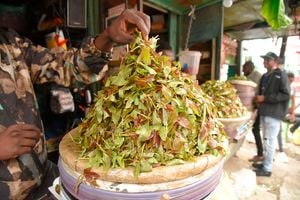
Senate Agriculture Committee Chairman and Kirinyaga Senator Kamau Murango.
Senate Agriculture Committee Chairman Kamau Murango has claimed tea farmers from the West region were to blame for market crunch and poor returns, injecting fresh controversy on quality of billions worth of unsold tea.
Tea farmers are clustered into two--those in the East of Rift and those in West of Rift, politically read as Mt Kenya versus the rest of the country.
This comes as the country is facing a market crisis leading to unsold harvest said to be in the range of nearly 120 million kilos in 2023 and by June 2024.
Reports indicate that 20 million kilogrammes of tea produced in 2023 was yet to get a buyer while an additional 95.2 million kilogrammes of fresh tea was unsold as of the end of June 2024.
On July 28, while speaking in Embu County, Kenya Tea Development Agency (KTDA) Board Chairman Enos Njeru admitted there are unsold volumes in warehouses that KTDA expects to dispose by September.
The produce continues to accrue high warehousing charges that are eating into farmers' intended gain.
The crisis rocking the tea sector has attracted the attention of Deputy President Rigathi Gachagua and Prime Cabinet Secretary Musalia Mudavadi.
Leaders' intervention
Gachagua and Mudavadi have sought to explain to the nation what might be the cause of the crisis, Mr Murango alleges "our problem is from the West side quality".
Speaking on Inooro TV, Mr Murango claimed that farmers from the East are more sensitive to quality produce while their counterparts from the West are more obsessed with volumes.
"I can report this without fear of contradiction, that those of us in the East of production cluster harvest two leaves and a bud per pick which guarantee quality. Our counterparts from the West harvest four leaves and bud leaves per pick which waters down quality," Mr Murango said.
He said the end result is country's market fortunes tilting in favour of the eastern side where a kilo even attracts six dollars at the auction, the other sales attracting as low as a dollar per same measure.
"The other harvests attract poor prices which the farmers refuse. The market clears the East's produce and the country uses those gains to even pay the West's unsold deliveries," he claimed.
Mr Murango added that the math that ensue are those of intricate balancing where reconciling the payments to all farmers amid disparity of quality and unsold produce defines the unexplained storm that is rocking the sector.
Mr Murango said: "If we were to apply uniform quality of harvesting and clean the value chain of manipulation by brokers we can afford to pay the farmers Sh60 per kilo as Minimum Return Guarantee."
The average payout rate per kilo currently stands at Sh25.
The government has since urged both the Tea Board of Kenya (TBK) and KTDA to provide details of all unsold tea held at the Mombasa auction.
While Mr Gachagua has announced that he will pitch camp in Mombasa to monitor the situation that threatens to delay payments of bonus, Mr Mudavadi is writing letters.
"This intrigue of unsold tea owing to quality and brokerage issues is giving us a headache...we must insist on quality and market reforms," said Mr Gachagua in Murang'a County on August 9.
On his part, Mr Mudavadi has since written to KTDA and TBK demanding a declaration of stock crisis in the warehouses.
“I request your office to provide the following information on shelf life of the unsold tea, space occupied, stocks of unsold tea currently being held in Mombasa, lessors of the warehouses, and Who will ultimately bear the cost of warehousing,” Mudavadi letter reads, adding that he also seeks indebtedness status of the farmers by close of June 30, 2024.
He noted that the accumulation of unsold tea hampers producers’ ability to pay farmers on time, significantly affecting their income, a situation that has resulted in accumulation of unsold teas at the auction, severely impacting prices and causing a market glut.
Mr Murango said mechanisation in the sector must not play out to the advantage of unscrupulous multinational brokers who cashes on quality inequalities to play around with buyout and payout rates.
Mr Murango said the country urgently needs a law to restrict harvesting tea to three leaves per pick.
"We also need a system that will ensure tea hawkers are defeated since they are the ones who encourage farmers to harvest five leaves per pick as the scramble for hawking gains play out," he said.
He added that the West side has made it normal routine for farmers to harvest poor quality leaves "since that confusion enables some unscrupulous managers manipulate weights and measures as well as books of account".
He said the sector's elections end up being a circus as interest to maintain the confusion leads to East and West conspiring to share management slots with the sustenance of the confusion being a bargaining factor.
"That is why you find the East being proposed to bag the chairmanship while the West is content accepting to deputise," a move interpreted to be trading of horses to keep the status quo that defines the confusion intact.
On July 28, Mr Njeru said West farmers need to be sensitised on quality production.
“To our farmers in the West...I am coming there with a new strategy...I want to help them fetch good returns like East farmers,” he said.
He said he will cooperate with all leaders to ensure tea sector reforms encompass all progressive thoughts to ensure volumes increase with the highest standard of quality.
He agreed that there is a challenge of quality production in the West, saying he will unleash a strategy of civic education.
"We can speak of every other thing that is meant to increase farmers’ earnings but we must all agree that quality of produce is key. To our West farmers, I will come up with a strategy to help you get it right," he said.









